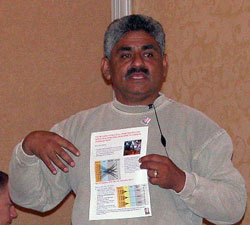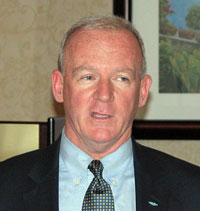 We have a lot of participants in this AASHTO Interstate Convoy and I’ll be featuring them as I have time during the trip. One of them that we learned about this morning is Albert Renteria, founder and president of Operation Interdependence.
We have a lot of participants in this AASHTO Interstate Convoy and I’ll be featuring them as I have time during the trip. One of them that we learned about this morning is Albert Renteria, founder and president of Operation Interdependence.
Albert says that a lot of the stuff sent to our deployed military doesn’t get where it’s supposed to be and a lot of money is wasted in the attempt. His organization has been formed to create a system that makes it easier to send items and easier for the soldiers on the receiving end to manage the materials. Additionally, his system saves money by being more efficient in how it packages and schedules regular monthly shipments.
I’ll let him explain what Operation Interdependence does in his own words:  Albert Renteria Interview (5 min MP3)
Albert Renteria Interview (5 min MP3)


 In 1919 Lt. Col Eisenhower (later to become President of the USA) made a cross country trip with primarily military participants. It showed the need for a good system of roads in this country which became the interstate system. Our commemorative journey in the reverse direction wouldn’t be complete without today’s military, represented by these Army soldiers. They are from left to right, Sgt. Alicia Sexton, SSG Eric Miller, SSG Adron Hayes and Sgt. Eggleston Jeter. All are with the Movement Control Team. They’ll be leading our convoy.
In 1919 Lt. Col Eisenhower (later to become President of the USA) made a cross country trip with primarily military participants. It showed the need for a good system of roads in this country which became the interstate system. Our commemorative journey in the reverse direction wouldn’t be complete without today’s military, represented by these Army soldiers. They are from left to right, Sgt. Alicia Sexton, SSG Eric Miller, SSG Adron Hayes and Sgt. Eggleston Jeter. All are with the Movement Control Team. They’ll be leading our convoy. Part of our training session here in San Francisco prior to departing on our cross country trip to celebrate the interstate involved becoming certified in the
Part of our training session here in San Francisco prior to departing on our cross country trip to celebrate the interstate involved becoming certified in the  I’m not the only one writing about ethanol on the road. So is Rick Tolman, CEO of the National Corn Growers Association. Rick’s posting some road commentary on E85 which you can find
I’m not the only one writing about ethanol on the road. So is Rick Tolman, CEO of the National Corn Growers Association. Rick’s posting some road commentary on E85 which you can find 

 Archer Daniels Midland CEO Patricia Woertz is expecting big profits from biofuels for her company in the next few years. According to an
Archer Daniels Midland CEO Patricia Woertz is expecting big profits from biofuels for her company in the next few years. According to an  Financial services are buzzing this morning with the red-hot debut of VeraSun’s IPO. In the most recent
Financial services are buzzing this morning with the red-hot debut of VeraSun’s IPO. In the most recent  Hello from San Francisco. I know I said I’d start blogging the AASHTO 50th Anniversary of the Interstate event tomorrow but things got kicked off today. Right now those of us participating in the convoy that will take off Friday are getting prepped by Sunny Schust, director of communications for the
Hello from San Francisco. I know I said I’d start blogging the AASHTO 50th Anniversary of the Interstate event tomorrow but things got kicked off today. Right now those of us participating in the convoy that will take off Friday are getting prepped by Sunny Schust, director of communications for the 
 America is not the only country addicted to oil. China is now considering a change in energy policy to encourage the wider use of ethanol in order to improve air quality. According to
America is not the only country addicted to oil. China is now considering a change in energy policy to encourage the wider use of ethanol in order to improve air quality. According to